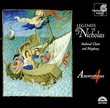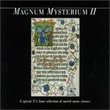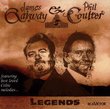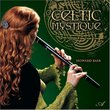| All Artists: Guillaume Dufay, Andrew Kirkman, Binchois Consort Title: Dufay: Music for St. James the Greater Members Wishing: 0 Total Copies: 0 Label: Hyperion UK Release Date: 6/9/1998 Album Type: Import Genres: Special Interest, Classical Styles: Opera & Classical Vocal, Historical Periods, Early Music Number of Discs: 1 SwapaCD Credits: 1 UPC: 034571169972 |
Search - Guillaume Dufay, Andrew Kirkman, Binchois Consort :: Dufay: Music for St. James the Greater
 | Guillaume Dufay, Andrew Kirkman, Binchois Consort Dufay: Music for St. James the Greater Genres: Special Interest, Classical
"The moon of all music, and the light of all singers," was how one contemporary observer described the illustrious 15th-century French composer Guillaume Dufay. Dufay not only enjoyed great acclaim as a musician, but he ... more » |
Larger Image |
CD DetailsSynopsis
Amazon.com "The moon of all music, and the light of all singers," was how one contemporary observer described the illustrious 15th-century French composer Guillaume Dufay. Dufay not only enjoyed great acclaim as a musician, but he also enjoyed an unusually long life--he died at 74--which he spent in service to several noble patrons in Italy and as canon of Cambrai Cathedral in France. His music exudes an amazing richness and vitality, due as much to its luminous harmonic writing as to its lively, complex rhythms. The veneration of St. James was of enormous importance in the Middle Ages, signified by the thousands of pilgrimages to the cathedral of Santiago de Compostela in Spain. Dufay's Mass is unusual and remarkable for its stylistic diversity, a feature of the work that's prompted much musicological investigation. For most of us, however, the sheer beauty of the music--exemplified in these resplendent performances--speaks for itself. --David Vernier Similar CDs
Similarly Requested CDs
|
CD ReviewsGreat! Micky | St. Louis, MO USA | 10/11/2000 (5 out of 5 stars) "This mass is not popular. However, the mixture of medieval and Renaissance styles is really beautiful. This is certainly a Dufay's music: deep, warm, mesmeric, and confortable. Kirkman's performance is also unbelievable. This is one of the best recordings of Dufay's." The More Things Change ... Giordano Bruno | Wherever I am, I am. | 02/02/2010 (5 out of 5 stars) "It's interesting how hard it is to think about evolution without lapsing into a discourse of Progress - of 'Entwicklung', development, improvement. But the bottom line of evolution is contingent and constant change, not improvement. You, dear reader, are no more highly evolved than a green sea turtle, nor any more complex than an army ant; you simply value your own complexity disproportionately. The history of music also suffers from a discourse of 'development'. Perceptive listeners can still be trapped in the notion that the imitative counterpoint of Josquin is more 'advanced' than the seldom-imitative polytextual polyphony of Dufay. Quatsch! Nobody has ever written more 'advanced' music than Dufay... not Josquin, not Bach, not Beethoven, not Wagner, not even Brian Wilson. You have only your two ears, you know, through which all the ambient sound funnels to your brain, and 'what you hear is what you hear.' Music in Europe did CHANGE rather dramatically in the short span of time between Guillaume Dufay (1400-1474) and Josquin Desprez (1455-1521). The most easily quantifiable change was the shift in 'prolations', from preponderantly "perfect" (triple) tempi to "imperfect" (duple) tempi. You can hear that change by comparing any performance you have of Dufay to any of Josquin's disciples like Mouton or Willaert. That change was symptomatic of a change in the most basic mode of "hearing" music, which I can describe as a change from Time to Space. The aesthetic core of Dufay's music is the passage of Time; one hears it 'horizontally' - in the flow of Time captured as immediate sensual perceptions. The consummate craft of Dufay's music is its rhythmic inventiveness. By comparison, Josquin's music is 'all about' melody, which is a sort of derived experience based on Memory. No memory, no melody! Thus Josquin's music is less about Time and more about Space, or Spaces ... music conceived architecturally and heard as much vertically as horizontally. (I hope that makes sense; if it doesn't, blame it on too many cups of espresso.) And what about this recording of Dufay's "Mass for Saint James the Greater' by the eight male singers of the Binchois Consort? Put simply, we ought to beatify Saint Andrew Kirkman the Greatest. Contrary to one utterly foolish earlier review, such a performance by a small choir of men, including falsettists, was absolutely the norm in Dufay's era; in fact, any other kind of performance would defy all historical scholarship and, to my ears, defile the music. How could a large choir in a reverberant space make any acoustic sense of such music? But beyond authenticity, there's the artistry of the singers to be reckoned with, and these guys of the Binchois Consort are astonishingly good, each 'pair' of them in precise accord and all eight of them in Swiss-watch tight ensemble, both of tuning and of rhythmic expression. The overlapping prolations of this mass -- polyrhythms, you could call them -- are the flowers of Burgundian musical craft, and the Binchois boys nail them all like perfect-score gymnasts. Besides the Mass for St James, this performance includes three wonderful polyphonic antiphons by Dufay, plus two mass movements (Gloria & Credo) in a different vein, full of Italian song snatches and popular musical touches that suggest Dufay's awareness of the "laudesi", the singers of the mostly bourgeois confraternities of Italy, where the Burgundian Dufay spent time. The Credo is one of the most 'amusing' pieces of liturgical polyphony you'll ever hear. I can hardly believe that other reviewers have treated this CD so shabbily. It's the most polished and enjoyable performance of Dufay yet offered to the modern public." One Apple Can Spoil the Whole Doug - Haydn Fan | California | 02/04/2010 (4 out of 5 stars) "Giordano Bruno, who writes so very well about the music of the Renaissance, recently in another review makes very good comments about single voices versus whole choirs, and how beauty in singing can be obscured. I must add to the several telling observations he makes - It takes only one bad voice to hurt a performance. This goes double when the music is so nakedly exposed as are the lines of Dufay. Just as a rope is only as strong as its weakest strand, so it is with music of this period, where, as Giordano quite frequently rightly reminds everyone, single voices, rather than bunched choirs, work best in presenting Dufay's marvelous music.
And that is what, at least to my ear, is sometimes on display here. Almost all of the singing on this recording is quite superb - just wonderful. But for me, and obviously one other reviewer, whose general lack of understanding is at least partially balanced by his sense that something in the higher range sounded wrong, there's a problem. And however all wet the other negative reviewer is on most of what he says, there are dififculties in the alto parts, they exist and appear too often. Now I'm NOWHERE near as picky as Giordano - whose hearing and taste are first rate - so this confuses me. If I can hear it, so I should think can anyone. Compromised singing is what it is in ANY age. And these alto issues stand out for me when other voices - including some of the other altos - reveal wonderful intonation and marvelous tone; it's not like no one in the group understands how to sing. Having essayed alto myself, I know it's challenging - but alto singing has come a long, long way these last forty years. Myabe four good altos remains the Renaissance equivalent of finding a full complement of great singers for Meyerbeer's Les Huguenots. Anyway, all this complaining should NOT be taken as a push for replacing men with sopranos - but whenever I hear these problems I can at least realize the thinking behind such historically dubious practices. Finally, all the overwhelming praise accorded this recording in all quarters worries me - have I lost my hearing? Must be the case! A lifetime spent in careful listening to singers and following scores now disappears into the void! " |

 Track Listings (14) - Disc #1
Track Listings (14) - Disc #1









